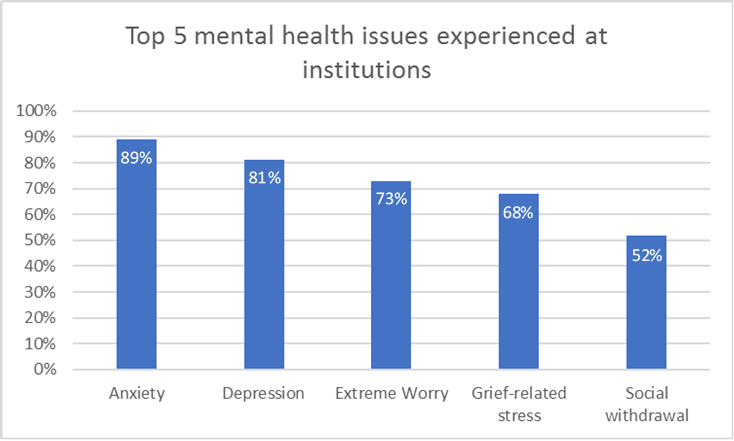With reported cases of depression and suicide, WISDOM DEJI-FOLUTILE writes that life is not always a bed of roses for Nigerians schooling overseas
Nigeria by far leads Africa with the most overseas students. In 2020 alone, about 100,000 Nigerian students went abroad for their studies (monitor.icef.com). Despite the expenses involved and the availability of globally recognised higher institutions in the country, the decision is a no-brainer for many members of the country’s working class.
The uncertainties involved with public higher institutions in the country, the improved access to opportunities, and of course, the possibility to relocate for good through a school programme makes studying abroad a common goal for many Nigerian students.
Often, the allure of foreign education and the expectations that come with it are not misplaced. Nigerians who earn a degree studying abroad usually have access to better opportunities for work and often use their education to relocate to seek greener pastures. Students who lack access to the funds or who do not meet the academic criteria for scholarships or grants rue their predicament of struggling to cope in Nigeria’s dilapidated education system.
Amid all glowing recommendations, it is easy for guardians and wards to get carried away without considering the difficulties of making a life-altering change of travelling to a foreign land to study.
In March, it was widely reported that an unnamed DAAD scholar from Nigeria, who was in Germany for his PhD, committed suicide. The situation brought to light the untended pressure and struggles of Nigerian students in the diaspora. Attaining a degree, at any level, is a gruelling process, and can become even more complicated if one is going through life-altering changes and is not surrounded by the right support system.

Massive changes such as relocation to foreign soil to obtain a degree pose a substantial mental health risk, especially to persons who fail to adapt appropriately.
Franktalknow spoke to other Nigerian students who studied or are currently studying abroad to shed more light on the harsher realities of schooling abroad.
Chiagoro Ahaotu, a Nigerian in Europe pursuing a graduate degree in renewable energy, spoke to our correspondent on his experience studying abroad. He admitted that he had experienced “a lot of culture shock”.
When asked about his struggles with mental health in the early days of his studies, Chiagoro was glad to open up. The bright young man began his master’s programme just a year ago, during the global pandemic. Chiagoro is an Erasmus Mundus scholar under a programme funded by the European Union.
The unique nature of the programme means that Chiagoro has toured three countries in Europe over the past year.
“As part of my master’s programme, I am to study in three countries in three universities. I studied in Scotland, Spain, and I’m currently in Norway studying at the Norwegian University of Science and Technology,” he said. “This was all to be done in the midst of a global pandemic. It wasn’t the easiest decision – first of all, having to relocate with all the uncertainty.”

Chiagoro’s semester began in August 2020, and he recalled being excited at the prospect of studying abroad and how delighted he was to realise his dream.
However, his fairy tale start to studying abroad hit a snag when he realised he had to take all his courses online. He humorously referred to it as ‘Zoom university’.
“The semester began, and it was entirely online. I never got to see the walls of the classroom. Everything was virtual. I never got to meet my classmates up until the Christmas break after the Scottish Government relaxed some of the Covid rules,” he said.
“It was quite an experience. The loneliness was real”, he opened up.
‘Weather, language barrier depressed me’
Unlike Nigeria’s tropical climate, the weather in Europe and North America was the first cause of worry for Chiagoro.
This was a change he took note of almost immediately, just months into his study in the United Kingdom. According to him, the reality of the harshness of winter – which perhaps many Nigerians will find hard to visualise due to unrealistic portrayals in movies – was so jarring for him that it made him depressed.
“One of the first things that got me depressed was the weather. In Nigeria, we have a very good climate. But in the UK, especially if you’re experiencing it for the first time, winter is harsh. It is so funny when you see the movies, and it looks very good, and you want to experience winter. But trust me, winter is one of the most depressing seasons anyone could ever experience.”
Chiagoro said another thing that affected him was the change in the duration of daylight during the winter season. According to him, this made it harder for him to adapt.
“During the winter, it got dark as early as 3 pm. That messed with my body clock. There were times I woke up around 11 am (after working through the night), and you have only 3 hours of daylight.”
Chiagoro said it made him “almost crazy”.
The cuisine change also affected him. Although many Nigerian restaurants provide local dishes abroad, Chiagoro noted that they were usually expensive.
“In Spain, my major challenge was the language barrier. I couldn’t speak Spanish, and I couldn’t speak Basque,” he said.
‘I had to repeat every word’
Another Nigerian studying at a university in the US, who wanted to be identified simply as Tolu, shared her early experiences with our correspondent in an interview. Her experience followed a similar pattern to Chiagoro’s. She had been very excited at the prospect of studying abroad and saw it as a realisation of a somewhat lifelong dream. However, In Tolu’s case, the problem was not the harsh reality of freezing weather, adjustments to new day cycles, or language, but something more benign: her accent.

“When I came to the USA, I was very excited to further my education and get better opportunities. It was all good when I gained admission until I started going for classes,” she said.
“It was so hard for me to fit in. My accent was different.”
Tolu expressed her frustration with often having to repeat her words before she could be understood. Eventually, this discouraged her from participating because it was so difficult for her.
“Most lecturers loved participation, and it was part of our grade, but it was hard for me to participate. I had to repeat my words like three or four times before they were able to hear me, and it was hard,” she said.
‘I suffered from depression’
A student of Leeds Beckett University, simply identified as Tomiwa, arrived in England shortly after the pandemic was in full swing. He expressed that his experience was unpleasant, especially since he went without friends or family.

“Loneliness, depression, anxiety. Whatever. It was very unpleasant for me when I got here. I had a great job in Nigeria and juggled it with my music career, which wasn’t doing too bad. But I decided to come here to further my education and get a master’s degree.”
He recounted how lonely it was for him initially, which made him very unsettled, especially because he arrived in England in the thick of the pandemic and was affected by the strict lockdown.
“The pandemic really hampered most things for me. Even thinking back on it now, I don’t really know if I could have done anything differently. But the entire experience was just very unpleasant for me at first.”
‘Even with a family here, I struggled’
Mofe, who recently moved to the UK to further her education, said that even with a community of relatives around her, she still had a little bit of a challenge adapting properly.
“I will not say I suffered loneliness or from depression when I came to the UK because I have family members here, and my mum stays in the UK. But once in a while, I miss my friends and family in Nigeria, and certain situations remind me about them,” she said.
She mentioned that not having Nigerians from her peer group greatly affected her.
“…There were some things my family members could not help with, and the fact that I did not have friends or someone that is my age mate to have a conversation with was one thing I struggled with,” she recounted.
‘Our coping mechanisms’
Clearly, struggling with change profoundly affects students in the diaspora. However, change is constant and often inevitable for Nigerians travelling to school overseas.
When asked how he eventually coped with the drastic change of living abroad, Chiagoro mentioned trying to keep in touch with friends and family via social media.
“WhatsApp, Zoom – you name it. I speak with my parents every day,” he said.
“Asides from that, I have also tried to form my own community. In Spain, I searched online for language exchange forums where I could get to learn the language.”
With the help of an app that helped him find language exchange forums around him, Chiagoro said he could attend some meetings and eventually picked up some Spanish phrases.
“It has been very helpful in handling depression,” he said.
Tolu told our correspondent that she has only been able to cope by constantly reminding herself of her parents’ sacrifices and wanting to make them proud.
“The only way I’m coping with this isolation is reminding myself that I’m here for my future, to be the best and make my parents proud,” she said.
Tomiwa said he joined a local church to help him cope with loneliness.
“When I was in Nigeria, I wasn’t really a churchgoer. I only used to attend Easter, Christmas and New Year special services. However, since coming here, I have tried to stay consistent with my community church”.
Mofe, who has spent barely three months in the UK, said she tries to “keep herself busy” as much as possible.
“I attended as many events as I could at the beginning of the semester, and I was able to meet a lot of people. I also joined a society to immerse myself in the school’s activities further and find new friends. It was very helpful. Most of my good friends now were from the events I attended,” she said.
Troubling statistics

Cases of international students falling into depression have trended upward in recent years, especially since the onset of the coronavirus pandemic that greatly affected social life in most parts of the world.
A 2021 report released by frontiersin.org further established that a significant number of international students living in China battled mental health issues in 2020. The report detailed that an online survey conducted on 402 full-time international students across 26 provinces in China revealed prevailing symptoms of depression, anxiety, stress, insomnia, loneliness, psychological distress, and fear.
Another report, one done by One Voice Canada, noted that suicides among international students had been on the rise. The study pointed out that the problem has also been prevalent in places like Australia over the last decade.
In 2020 alone, the High Commissioner of India to Canada, Ajay Bisaria, disclosed that six Indian students studying in Canada committed suicide.
In January 2020, a 21-year-old Chinese international student, Jiaqi He, committed suicide while undergoing her graduate programme at the University of Melbourne. In September of the same year, 21-year-old Amrinder Singh, an international student at Douglas College, committed suicide due to financial pressure and insufficient support.
Curbing mental health challenges among overseas students
According to experts, adapting to life abroad is not a walk in the park. It takes a toll on students not only physically but also mentally. The experts cited a pattern cropping up in the multiple discussions with Nigerian students studying abroad: feelings of loneliness, anxiety, and outright depression.
However, despite the prevalence of mental illness among students, experts decried that many parents and guardians usually shut down such discussions.
The experts stated that many parents and guardians ignore the cautionary tales of depression and even suicide, thinking it to be wholly incompatible with the experience of a young adult who has just been given an opportunity of a lifetime.

However, experts said simply ignoring the problem will not make it go away, and neither will waving a wand and saying ‘hocus-pocus’.
Ms Joy Aiyepeku, a psychologist and mental health consultant, spoke to our correspondent about the very prevalent mental health challenges among students in the diaspora and the possible dangerous long-term effects.
“I have a few friends that study outside the country. Most of them have similar experiences. (Usually) a feeling of anxiety because they just went through a huge change, a change in environment, people, even a change in system. These things can adversely affect them. It can affect their thinking process, and so on,” she said.
Aiyepeku noted that people with no prior experience schooling abroad tend to suffer more.
“For people that have never gone abroad prior to schooling abroad, I see that their experiences are more intense: more intense homesickness that can lead to feelings of anxiety and depression,” she said.
“With human beings,” Aiyepeku continued, “there is the innate ability to adjust. But this isn’t the case for everyone. For some people who have had a mental illness diagnosis before travelling abroad, school can make it harder for them to adjust.”
“And for those who are going for the first time, a long-term effect is that it can lead them to develop a mental illness. It can lead to social anxiety disorder, where in every social situation, they become more aware of how they are different from anyone else,” the expert added.
Dr Olugbemi Olukolade, a clinical psychologist, said that Nigerians mostly overlook mental health problems when considering studying abroad because they have lofty expectations, which sometimes leads to disappointment.
“Most of the time, people leave home with the expectation that things are going to be greener or better in those places, but unfortunately, they get there, and there’s a reality shock,” he said.
He explained that the nuances in a foreign culture, which many are usually not familiar with, make the experience disorienting for students.
“You know, our psychological state has a lot to do, not just with ourselves, but the way we can manage our interactions with other people. And this goes a long way in people developing mental health problems,” he added.
Dr Olukolade mentioned that a possible negative effect of handicapped social interaction is drug abuse.
“I’ve seen situations where people, because of their inability to integrate with others well enough, go into making friends with substances like alcohol, cannabis, and cocaine which go on to disrupt their lives. In some instances, people don’t go into such substances, but they become people with clinical depression, major depressive disorder, and things like that. That shows you that there is a lot more to look at when going out of the shores of Nigeria to study,” he said.
Speaking on adaptation mechanisms, Aiyepeku advised prospective students to “expect it to be different.”
“One thing I will say is, expect it to be different. A lot of people cope by being positive to an extent when they expect that everything will just be okay at any time. But, expect it to be different. The people are going to be different. The culture is going to be different,” she said.
Aiyepeku also advised students to take advantage of Nigerian bodies for international students, which she said usually exist in many institutions.
“There are some Nigerian bodies for foreign students in most universities. For most that are religious, find Nigerian churches because of the community it will give you,” she said.
“Do not skip your orientation, especially the international students’ orientation. You will meet people there, and that can help you form a bond. Be in touch with the international body in your institution and always ask for help so that you don’t try to figure it out on your own.”
Speaking on what students who are abroad or considering a foreign education should do, Dr Olukolade mentioned that people need a support system, and they need to manage their expectations.
“One of the first things to do is to understand where you are going. Many times, people just think, ‘don’t worry, when you get there you’ll be able to work and go to school’. It’s not that straightforward. It is also much more than sending money to a child,” he said.
The expert advised parents and guardians also to be mindful of the pressure that comes with ascribing “exaggerated value” to the opportunity of studying abroad.
“You need a support system for a child, wherever they are going. You also need to give the assurance that this is not a do or die. People should know that it is just an option, and not the end itself,” he said.
























